Georgetown Law Remembers Justice Sandra Day O’Connor, H’86
December 4, 2023
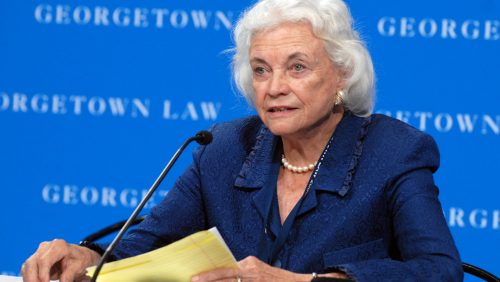
Former Justice Sandra Day O’Connor speaking at a 2007 conference at Georgetown Law
Sandra Day O’Connor, H’86, the first woman to serve on the United States Supreme Court, died December 1, 2023 at the age of 93. During her time on the Court, and especially afterward, she formed deep relationships with the Georgetown Law community.
“As the first woman to be named to the Court, Justice O’Connor was an historic trailblazer, and as a lawyer, politician and justice, she embodied the highest ideals of the legal profession,” said Dean William M. Treanor. “When she received an honorary degree from Georgetown Law, she spoke of how a good lawyer had to have not only skill in the law, but a moral and social conscience. In her decisions, her writings and in the way she lived her entire life, we see that commitment. She was also a great friend to Georgetown Law, and my colleagues and our students benefited greatly from her presence and insight in the years following her retirement.”
In addition to speaking at the 1986 commencement ceremony at which she received that honorary doctorate, she was the keynote speaker at the dedication ceremony for the Law Center’s Eric E. Hotung International Law Building in 2004. In her remarks, she reflected on the growing importance of international engagement in the post-9/11 world.
“The efforts that Georgetown University Law Center makes to educate law students from this country and abroad about international law are efforts well spent… Because of the scope of the problems we face, understanding international law is no longer just a legal specialty,” O’Connor said. She concluded her remarks by pointing out the building’s proximity to Capitol Hill and to the federal courthouses. “I look forward to many contacts with you in these areas in the years ahead. You will be a very good neighbor indeed,” she said.
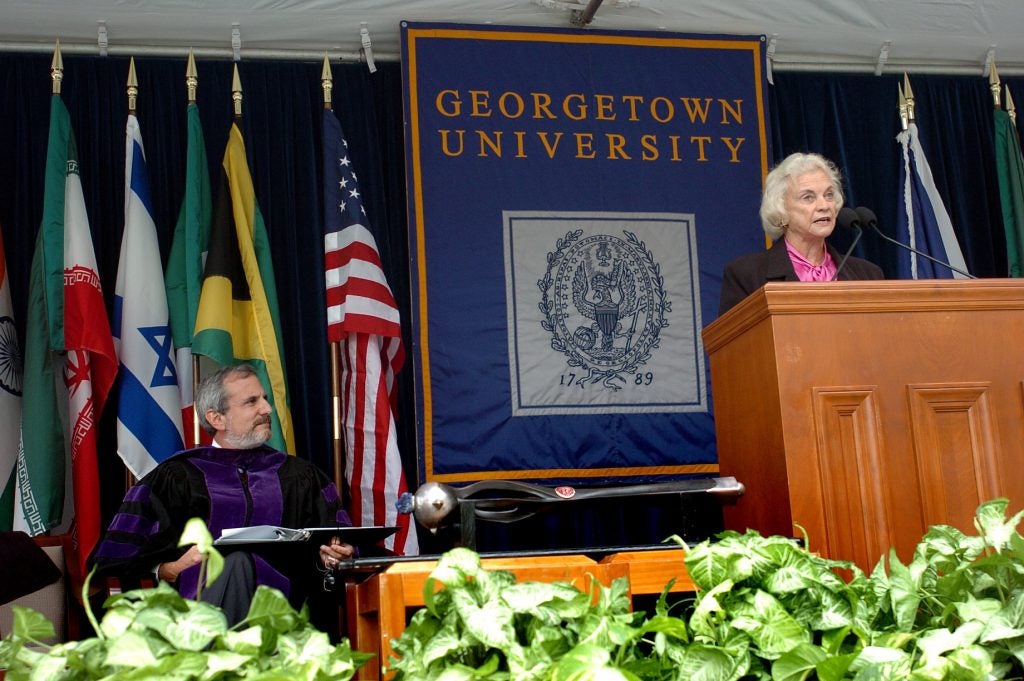
O’Connor, right, speaking at the 2004 Hotung Building dedication, with former Dean T. Alexander Aleinikoff at left.
O’Connor did indeed stay in close contact with the Law Center. After retiring from the Court in 2006, she partnered with Georgetown Law on “The Sandra Day O’Connor Project on the State of the Judiciary,” which between 2006 and 2009 organized a series of conferences dedicated to discussing various issues affecting judicial independence in the United States – a key concern of hers since her time as a judge in her home state, Arizona. The project also undertook additional initiatives, including events in partnership with other organizations, including the Aspen Ideas Festival and the Rehnquist Center at the University of Arizona School of Law.
Adjunct Professor Meryl Chertoff, now director of the Georgetown Project on State and Local Government Policy and Law (SALPAL), served as executive director of the O’Connor Project. Chertoff remembers a highlight of the project’s conferences being the on-stage conversations between O’Connor and her Supreme Court colleague Justice Stephen Breyer, in which they shared their thoughts on strengthening both judicial independence and civic education. “Their mutual admiration and shared dedication to these causes were both palpable and prescient, and I think were an inspiration to a generation of Georgetown students,” said Chertoff.
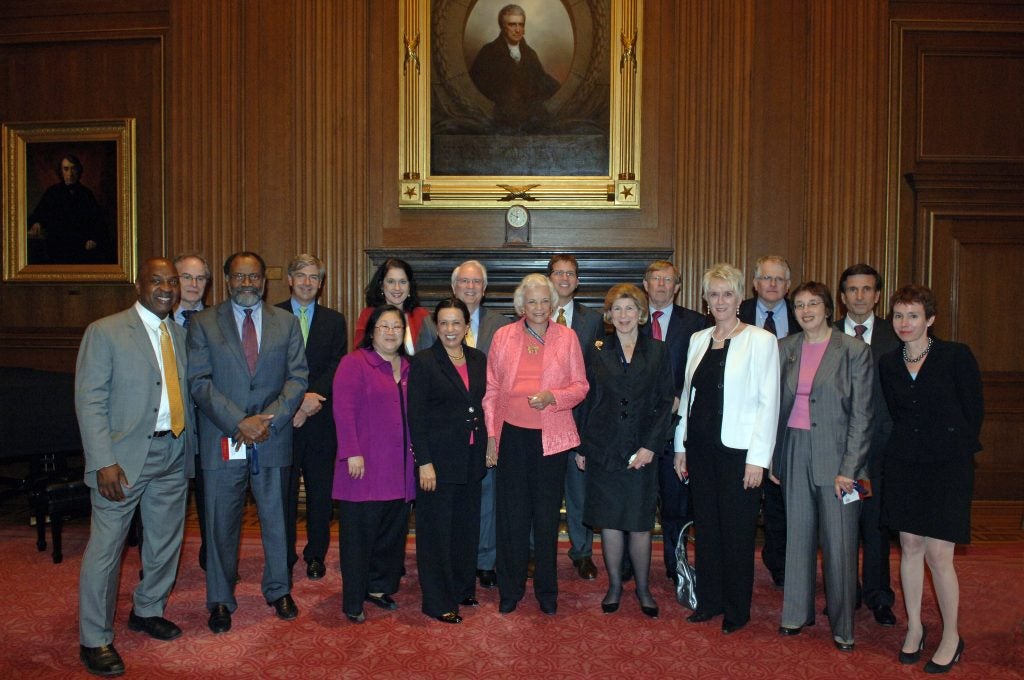
O’Connor, center, with guests at a 2009 event hosted at the Supreme Court as part of an O’Connor Project conference.
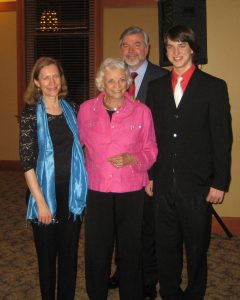
L-R: Prof. Jane Stromseth, former Justice O’Connor and Stromseth’s husband and son at a 2010 O’Connor clerk reunion in Arizona.
Professor Jane Stromseth served as a law clerk to O’Connor in 1988-89. Her reflections on the Justice’s legacy include her genuine interest in a diversity of viewpoints, her concern for the practical impacts of the Court’s decisions, her support for women and her encouragement to all her clerks to live a well-balanced life professionally and personally.
“Justice O’Connor deeply valued public service, including educating the next generation to contribute constructively to our democracy,” Stromseth said. “She was delighted when my Constitutional Law students came to the Court to hear arguments — and was tremendously supportive of young people and their aspirations to make a difference in this world.”
Professor Julie Rose O’Sullivan, who clerked for O’Connor in 1985-86, also reflected on the former Justice’s dedication to education. O’Sullivan worked closely with O’Connor to launch what became iCivics, a platform that uses games and videos to teach children about civics, and remembers one day in particular when her own son, Danny O’Sullivan, C’20, and niece, Aedan Collins, L’22, were recruited to demonstrate to the Justice how such games worked.
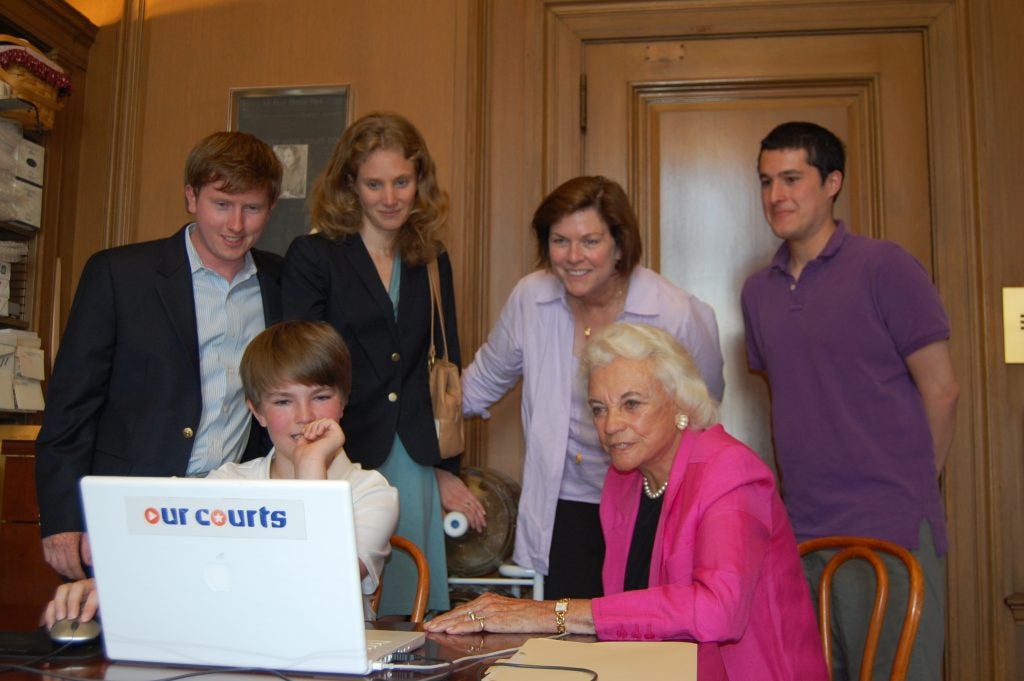
At front, Danny O’Sullivan, C’20, demonstrates a video game for Justice O’Connor. Looking on, L-R: civics project staffers Jeff Curley and Abby Taylor, Prof. Julie O’Sullivan and intern Willy Muse.
“The Justice was often quoted as saying that iCivics constituted her most important legacy. It says a lot about Justice O’Connor that she thought that inspiring new generations to be responsible participants in civic life was more important than all those 5-4 decisions. And that she was willing to move well past her comfort zone and totally commit herself to using new technology to move new generations to action,” said O’Sullivan. “We are grateful that iCivics was born at Georgetown Law. And we are even more grateful for all the time that permitted us to spend with the indomitable Justice Sandra Day O’Connor.”